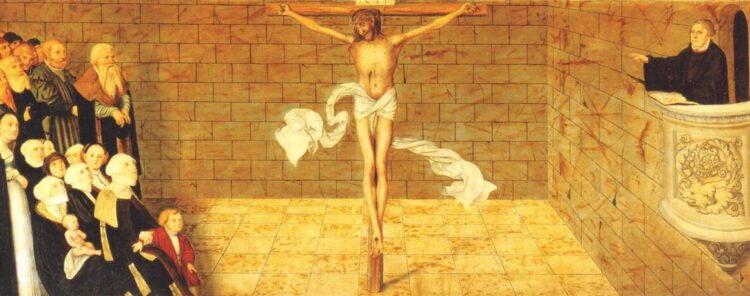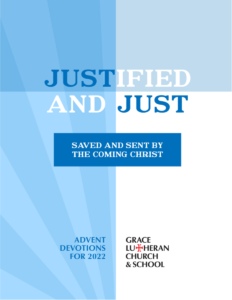Crux sola est nostra theologia.
“The cross alone is our theology.”[1] So said Martin Luther during the early years of the Reformation. The cross, which for Luther is shorthand for the death and resurrection of Jesus Christ, is the means by which God justifies sinners. The primary task in Lutheran preaching, therefore, is to proclaim God’s Word as law and gospel such that those who hear are gifted with new life, abundant and eternal, apart from anything they have or have not done.
If the cross alone is our theology, is there nothing left to say? What of God’s desire for justice to roll down like waters? These are not theoretical questions, but questions that demand practical attention. By the middle of 2020, the twin pandemics of COVID-19 and racial injustice combined to exacerbate a divide that already existed in North American Lutheranism. On the one hand are those who claim the mantle of “confessionalism,” who view sin as that which needs forgiveness from the individual. On the other are those who identify as “progressives,” who see sin as that which is wrong within structures and systems.
Does a theological tradition that places justification at the center have room for social justice, or would that create new “works” to be done? Is it time to move beyond justification and focus on what can be done in this world? Or, finally, is justice a natural result of having been made just?
A context of Grace
My ministry context is Grace Lutheran Church and School in River Forest, IL. Grace is an independent Lutheran congregation with a high regard for scripture and liturgy. Grace has a heart for the world but is in no way monolithic, with members holding a wide variety of beliefs regarding social issues and how, or whether, the church should respond.
So it was that my sermon on Pentecost Sunday, 2020, preached in an empty sanctuary to worshippers on their couches or at their kitchen tables, created a variety of responses. What I said was this: “This final week of Easter has been a stark reminder of just how badly we need Easter. We see the powers and principalities at work among us; we see sin and death at work in our world. So much is that should not be. George Floyd should not be dead. Police officers should not kneel on the necks of Black men.”[2] I am grateful that the vast majority of conversations that arose out of this sermon were caring and mutually supportive, but the question remains: Is this what a Lutheran preacher should proclaim, or should he stick to saving souls?
What then shall we say?
Then again, maybe that’s the wrong question. The problem for Lutherans is that we often get worked up over works righteousness, the idea that anything good we do can make us forget that salvation comes by grace alone. We are rightly suspicious of sanctification schemes which subtly make justification the beginning of a salvation we must work out for ourselves.This results in a common scheme for Lutheran preaching, in which a particular sin is used to illustrate the reality of universal sin, to which the universality of the gospel is than applied. The failure is in the lack of a final move: addressing the particular sin with both forgiveness and healing or overcoming that sin in real ways in the real world. Themes evident in the works of both German theologian Dietrich Bonhoeffer and liberation theologian Vítor Westhelle make a similar point: forgiveness that is universal but not particular is nothing but cheap grace, leaving the sinner untouched.
Justification and sanctification remain God’s gifts to us, but another move is now made. We are led to vocation, the particular work God would have each of us do in this world for the sake of our neighbor. Just as individual sin is named as evidence of universal sin, so should the proclamation of the gospel lead us back into the world. The way forward lies not in the doctrine of sanctification, but vocation, the many and varied particular ways Christians become channels for God’s grace to flow into this world. Once justified, how can we do otherwise? Here also the civil use of the law is reclaimed as we turn to God to learn how to live in community with God and one another.
The preacher’s task, therefore, must be grounded clearly in justification and sanctification as free gifts of God. But a second step is needed, one in which each believer hears not only forgiveness but also catches wind of the Spirit’s movement for the future of their lives. Good works are not needed for salvation, but there is good work for us to do for the sake of justice in the world.
Proclamation: particular and vocational
During Advent of 2022, I embarked on a joint ministry project with the people of Grace. Under the theme Justified and Just: Saved and Sent by the Coming Christ, we explored a simple yet deep question: How does what God has done for you lead you to live in the world? Lay leaders were invited to contribute 300-word daily devotions, which were then paired as conversation partners with midweek homilies I offered on texts from the Hebrew prophets. The resulting devotional booklet is an absolute treasure, witnessing to the lived vocation of the saints at Grace.
What we discovered is the power of particular proclamation in mutual conversation. The daily devotions that worked best were those that eschewed impersonal theologizing and prioritized personal narrative. Reflecting on the experience, people shared that they were moved less by the prescriptive and more by the descriptive. It turns out we don’t need people telling us what to do. We need people witnessing to what they have seen God do in their lives. The Spirit can take these strands and weave together for us a new vision for life in this world.
We learned to better see how Christian vocation helps us embrace concrete ways of living out our faith. Such living does not create constraints upon love; rather love now finds channels to enter into and create change within the world. This is the work of all of us. In the words of a Grace member who wrote the devotion for Christmas Eve, “We are sent as missionaries to our family, neighborhood, workplace, schools, and every other sphere of life.” Proclamation and conversation that moves beyond the universal to the particular creates the opportunity for people, freely justified and sanctified, to discover the great gift of vocation. We have already completed a second, similar exercise at Grace for Lent, 2023. We made sure to explicitly invite people to reflect on the particulars of the vocational journey, with wonderful results. I expect we will nurture, expand, and deepen this practice for years to come.
To that end, the preacher should speak particular words about particular situations, even during difficult, contentious times. Not for the sake of being partisan or to show themselves to be on the “right” side of an issue, but because this world is shot through with injustice and oppression, contrary to God’s desires. The preacher speaks out in lament and protest at the death of George Floyd (and others) not to be political, but because he was a fellow human being whom we, in ourselves and our systems, failed. Justified by grace, sanctified by the Spirt, we are gifted with vocations. Grounded in our confessions, we seek progress not toward salvation but toward a more just world. It is certainly within our vocations to witness to God’s coming reign, a reign that compels us to speak and act that justice would roll down as life-giving water.
The third and final midweek Advent 2022 service at Grace.
Further Reading
Bonhoeffer, Dietrich. Discipleship. Dietrich Bonhoeffer Works, Vol. 4., edited by Wayne Whitson Floyd, Jr., et al., translated by Barbara Green and Reinhard Krauss. Minneapolis: Fortress Press, 2001.
Forde, Gerhard O. Theology is for Proclamation. Minneapolis: Fortress Press, 1990.
Lose, David. Preaching at the Crossroads: How the world – and Our Preaching – is Changing. Minneapolis: Fortress Press, 2013.
Wengert, Timothy J. Word of Life: Introducing Lutheran Hermeneutics. Minneapolis: Fortress Press, 2019.
Westhelle, Vítor. “The Divergence between Lutheran Theology and Liberation Theology.” Liberating Luther: A Lutheran Theology from Latin America, edited by Robert A. Butterfield, 193-215. Minneapolis: Fortress Press, 2021.
[1] As quoted by Gerhard O. Forde, On Being a Theologian of the Cross: Reflections on Luther’s Heidelberg Disputation, 1518 (Grand Rapids, MI: William B. Eerdmans Publishing Company, 1997), 3.
[2] David Lyle, “Pentecost Sermon: God-Breathed Living,” Grace upon Grace, May 31, 2020


